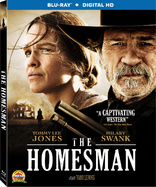The Homesman Blu-ray Movie
HomeThe Homesman Blu-ray Movie 
Blu-ray + UV Digital CopyLionsgate Films | 2014 | 123 min | Rated R | Feb 17, 2015
Price
List price:Amazon: $6.99 (Save 53%)
Third party: $6.99 (Save 53%)
Only 13 left in stock (more on the way).
Movie rating
6.8 | / 10 |
Blu-ray rating
| Users | 3.8 | |
| Reviewer | 3.5 | |
| Overall | 3.8 |
Overview
The Homesman (2014)
A claim jumper and a pioneer woman team up to escort three insane women from Nebraska to Iowa.
Starring: Tommy Lee Jones, Hilary Swank, Grace Gummer, Miranda Otto, Sonja RichterDirector: Tommy Lee Jones
| Western | Uncertain |
| Drama | Uncertain |
Specifications
Video
Video codec: MPEG-4 AVC
Video resolution: 1080p
Aspect ratio: 2.40:1
Original aspect ratio: 2.39:1
Audio
English: DTS-HD Master Audio 5.1 (48kHz, 24-bit)
Subtitles
English, English SDH, Spanish
Discs
50GB Blu-ray Disc
Single disc (1 BD)
UV digital copy
Packaging
Slipcover in original pressing
Playback
Region A (locked)
Review
Rating summary
| Movie | 3.5 | |
| Video | 4.5 | |
| Audio | 4.5 | |
| Extras | 2.0 | |
| Overall | 3.5 |
The Homesman Blu-ray Movie Review
The unforgiven.
Reviewed by Jeffrey Kauffman February 16, 2015There are times when the patent artificiality of western series like Little House on the Prairie can be a comforting balm. Sure, things were hard for the pioneers, but there was nothing that a solid family unit couldn’t overcome with hard work, commitment and (most importantly) love. In fact as I mentioned in the Little House on the Prairie: Season Four Blu-ray review, when an outright tragedy finally visited the Ingalls family late in that year, a health issue that stalwart Charles couldn’t solve with a snap of his fingers, it finally gave the series an emotional resonance that the tendency toward relatively easy resolution of problems and “happily ever after” by the closing commercial break tended to enervate. It’s hard to even contemplate how the stolid Ingalls family might have dealt with the devastation that is part and parcel of The Homesman, the second feature film directing effort on the part of co-writer and star Tommy Lee Jones (his first was the little remembered The Three Burials of Melquiades Estrada). The Homesman might almost be thought of as an anti- Little House on the Prairie, for it depicts a gaggle of characters who either by dint of their own peccadilloes and personal attributes or, more saliently, psychosis and/or “nervous breakdowns” are completely divorced from any sense of community, left to drift through an awesome Nebraska landscape largely alone, even when five of them are thrust together due to the vagaries of circumstance.
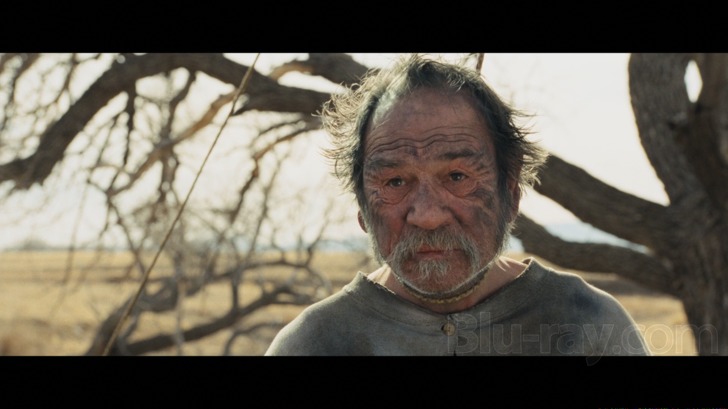
Mary Bee Cuddy (Hilary Swank) is a homesteader of grit and determination, having created a refuge of sorts out of the hardscrabble environment of Nebraska Territory in the mid-19th century. Mary Bee is on her own, though, and has set her sights on local farmer Bob Giffen (Evan Jones), a “neighbor” who drops by to enjoy some of Cuddy’s home cooking one night. The two indulge in fried chicken and a peach pie made from “canned peaches” (as Cuddy delightedly confesses to her guest), but when Mary suggests the two “formalize” their relationship, Bob balks, calling her “too bossy” and (perhaps even worse) “plain.”
Playing out interstitially with Mary’s story in this early going are several initially confounding snippets that show various other pioneer women, all of whom seem to be in various stages of personal crisis. Ultimately of course these stories intersect, but the structure of The Homesman continues to be an occasionally problematic element, with Jones providing backstory only fitfully, plopping the viewer down in media res in not just one, but several stories.
Mary is approached by the local preacher, Reverend Dowd (John Lithgow), another guy who seems to drop by the Cuddy house for a solid home cooked meal. Dowd discursively mentions some “troubles” that afflicted some local women, and Mary says she’s heard about everything. A scene at the local church finally reveals at least a little information about what’s going on—three women of completely different backgrounds have each suffered an emotional breakdown, to the point that their husbands and/or families can no longer care for them. They need to be transported to Iowa where they can be cared for either by family there or in an institutionalized setting.
A couple of convenient plot machinations appoint Mary as the “designated driver” who will transport the three addled women back to Iowa, a task which should take several weeks. Mary is provided with an enclosed wagon that portentously has anchors inside that allow the occupants to be tied down, and is on her way to begin picking up her charges when she encounters a haggard man named George Briggs (Tommy Lee Jones), who just so happens to be affixed to a noose and on the back of a horse he is rather desperately attempting to keep very still. Mary agrees to cut Briggs down from his near death experience if he promises to swear to the Almighty that he will help her get the women to safety. Briggs (whose real name may or may not be Briggs) agrees, though the none too subtle subtext is obviously that his vows to God aren’t exactly a reliable commodity.
To call what transpires dark and unexpected may hardly suffice to really adequately convey the psychological traumas that Jones attempts to deal with in the film. There’s an unrelenting aspect to The Homesman that initially may come on at least relatively benignly, but which soon gains surprising traction as the quintet of wounded souls makes their way eastward. The Homesman both exploits and confounds traditional western tropes. Jones and his cinematographer Rodrigo Prieto pay bleak homage to the wide open prairie, but the screenplay tends to tuck itself into various dark nooks and crannies of several claustrophobic psyches. The dialectic between external and internal realities is one of the film’s most interesting aspects, and one which Jones attends to very smartly from a directorial standpoint.
Still, The Homesman struggles at times to maintain a consistent tone. Part of this is due to the intentional gambit of doling out information about the three women in the back of the wagon in dribs and drabs, something that plays archly against what initially appears to be the more traditional burgeoning romantic aspect between Mary and Briggs. But in a startling relatively late development, the film takes a precarious left turn which at first is breathtaking but which then tends to become increasingly bizarre, even twee.
Despite its odd third act, The Homesman is another major showcase for both Swank and Jones (the actor this time). Both deliver solid, nuanced performances in a film that veers precariously close to becoming a cartoon (maybe more of a graphic novel, given its dour ambience) at times. The supporting cast (which includes James Spader and Meryl Streep in a glorified cameo) is also fantastic, and the film is ultimately such an unusual tale delivered in such an unsparing manner that its hard not to be won over by its true grit.
The Homesman Blu-ray Movie, Video Quality 
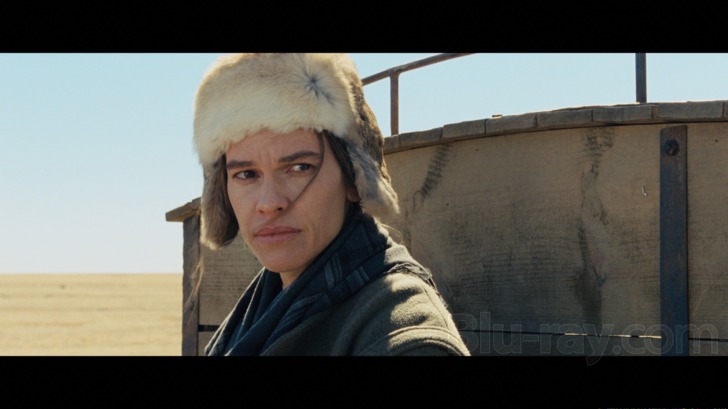
The Homesman is presented on Blu-ray courtesy of Lionsgate Films with an AVC encoded 1080p transfer in 2.40:1. According to the IMDb, The Homesman was shot on both film and digitally, but its presentation in high definition is surprisingly homogenous, with a brilliantly sharp and clear picture that can by turns offer an awesomely sumptuous widescreen panorama of open range, or a revealing close-up of Tommy Lee Jones' craggy visage. Some of the flashback material has been variously color graded, and while contrast is pushed in some of the sequences as well, detail still remains strong. Sharpness and clarity are top notch throughout the presentation. There are one or two incidents of banding (the worst is with the wagon moving across the horizon in front of the setting sun), but otherwise this is a problem free presentation that is often breathtaking.
The Homesman Blu-ray Movie, Audio Quality 
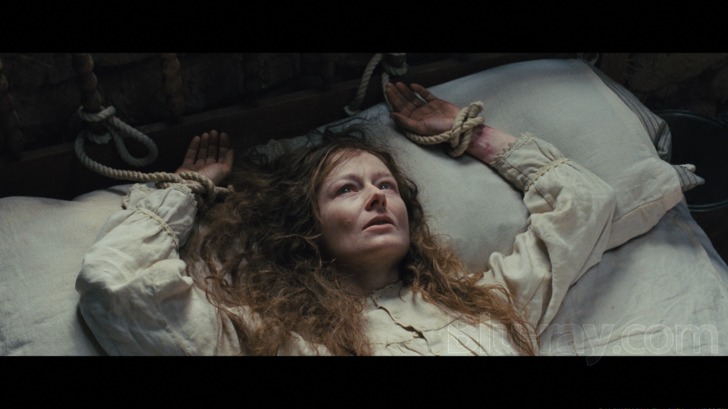
The Homesman's lossless DTS-HD Master Audio 5.1 track is sometimes subtle, but it offers a wealth of well placed ambient environmental effects as well as a suitably wide soundstage for Marco Beltrami's elegiac score. There's really nice attention paid to differing ambiences in terms of dialogue as well, with a hushed, cloistered feeling inside some of the tiny rooms the characters enter, and a more open, windswept quality out on the prairie. Dynamic range is a bit muted, but there are no problems of any kind to address in this review.
The Homesman Blu-ray Movie, Special Features and Extras 
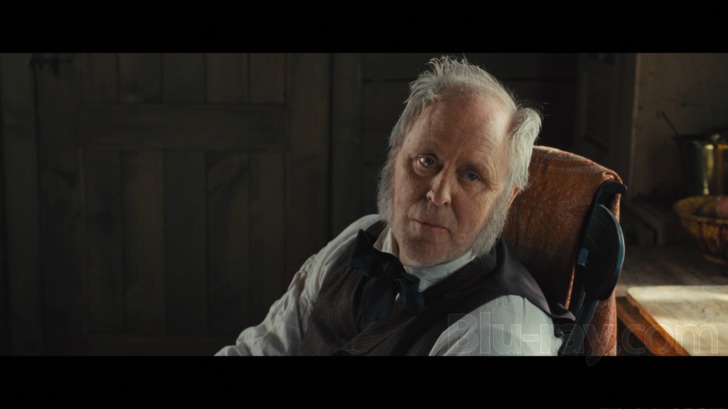
- Origins (1080p; 21:25) deals with elements like fashioning the screenplay and offers some decent interviews.
- Shooting the Film (1080p; 27:13) looks at some of the rigors of shooting the film on location (actually, more than one location).
- Beyond the Western (1080p; 11:45) details the efforts of this film to push the genre boundaries of the western.
The Homesman Blu-ray Movie, Overall Score and Recommendation 
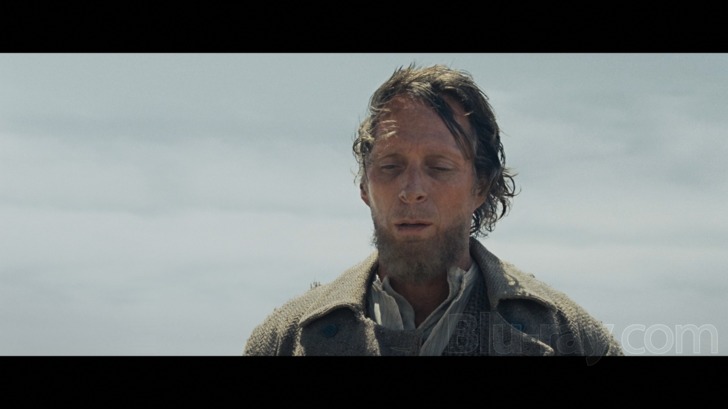
The Homesman is bleak and unforgiving, and has a rather apocalyptic view of what life in the wild west was like. The basic storyline is unusual enough to begin with, but a smart if very dark screenplay then adds at least a couple of rather unexpected detours, something that may provide a bit of relief from the implacably austere emotional content. Swank and Jones are fantastic in the lead roles, but this film will probably be an acquired taste for those who might be more partial to the calmer waters of outings like Little House on the Prairie. Technical merits are very strong, the supplements are enjoyable, and The Homesman comes Recommended.
Similar titles
Similar titles you might also like

Hostiles 4K
2017

Westward the Women
Warner Archive Collection
1951

The Claim
2000

Cimarron
Warner Archive Collection
1960

A Man Called Horse
1970

The Salvation
2014

Butcher's Crossing
2022

Horizon: An American Saga - Chapter 1
2024

Forsaken
2015

The Duel
2016

Jane Got a Gun
2015

Slow West
2015

Meek's Cutoff
2010

Jeremiah Johnson
Warner Archive Collection
1972

Unforgiven 4K
1992

The Kentuckian
1955

The Unforgiven
1960

Angel and the Badman
1947

The Hanging Tree
Warner Archive Collection
1959

Broken Trail
2006
